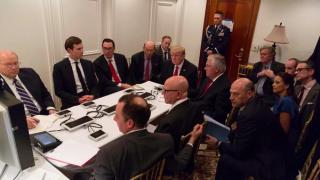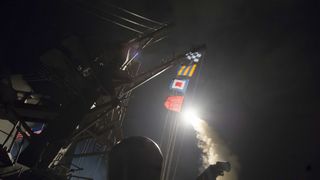"We see these beautiful pictures at night from the decks of these two US Navy vessels in the eastern Mediterranean," Brian Williams of MSNBC extolled on Thursday night, as the bright arc of a missile launch flashed across the screen. "I am tempted to quote the great Leonard Cohen, 'I am guided by the beauty of our weapons'."
Williams was not alone in viewing the Syria bombing as a moment worthy of solemn praise. CNN's Fareed Zakaria – who, like Williams, has been sharply critical of Donald Trump – said as the bombs fell, "I think Donald Trump became president of the United States" that night.
At the New York Times and the Associated Press, the missile strike did more than crater the Al Shayrat airfield. It carved out a new Trump doctrine, a foreign policy based on flexibility. Which is one way of describing the president's abrupt about-face on his America-first foreign-policy prescriptions. According to the White House, televised images of gassed children caused Trump to shed his Syria-skepticism, transforming him into a hero of neoconservatives and liberal interventionists.

But is this the start of a Trump doctrine? It's understandable that people would be searching for one. Doctrines rationalise and provide structure, something sorely needed in an administration thus far defined by its unpredictability and incoherence.
But the search for a Trump doctrine is futile. Trump is not a man of doctrines, but a man of impulses. In his brief time in politics, he has been enthusiastically inconsistent on nearly every front, save some parts of tax and trade policy. His foreign policy pronouncements were rife with inconsistencies: he'll cut the head off ISIS but stay out of the Middle East. He'll restore America's greatness in the world but hand over leadership to allies and regional powers.
Yet despite these contradictions, Trump has been a beacon of hope to non-interventionists and paleoconservatives who have seen in him a way to break the neoconservative stranglehold on the Republican Party. There was Trump, up on the debate stage, hammering not only Barack Obama but George W. Bush, calling the decision to invade Iraq "a big, fat mistake" and charging the Bush administration with lying about weapons of mass destruction.
It is a testament to the power of neoconservatives within the GOP that it took a figure such as Trump to smash through their orthodoxy. But it is one thing to provide a much-needed challenge to war-happy interventionism and another to offer an alternative doctrine in its place. When Trump landed on the phrase "America first", nationalists and non-interventionists believed he had revealed such an alternative.

The phrase "America first" has a deep history in US foreign policy, tracing back to the hodgepodge group of pacifists, socialists, anti-Semites and conservatives who opposed US intervention in World War II. It was a short-lived movement and many of its conservative members took a hawkish turn with the start of the Cold War. But no sooner had the Cold War ended than the idea of "America first" re-emerged. As championed by Pat Buchanan, it was a foreign policy doctrine that called for America to withdraw from an active, interventionist role in the world, to stick closer to home.
For Trump, however, "America first" was more a slogan than a policy. He certainly had no understanding of its history, seeing it instead as a expression of grievance over diminished national standing. When pressed in an interview last year to expound on the phrase, he simply said, "I like the expression", then carried on about the world's lack of respect for America, something he laid at the feet of Bush and Obama. "We have been disrespected, mocked and ripped off for many, many years by people that were smarter, shrewder, tougher."
That gets much closer to Trump's foreign policy impulses: a mix of grievance and opposition to the last two administrations. Over the past several years, Trump has charted his foreign policy in opposition to those two poles, the neoconservative foreign policy of Bush and the more cautious, halting policy of Obama. Trump came out against intervention in Syria as Obama pushed for it, but also bashed him for not doing anything after drawing a red line. He vowed to cut the head off ISIS but avoided any Bush-like calls for boots-on-the-ground. He knew what he was against. What he was for was more elusive.
As president, Trump now has to turn that rhetoric into policy. And his move in Syria shows how tough that will be absent any clear thinking on foreign policy. Forty-eight hours before the airstrike Trump and his secretary of state publicly proclaimed it would be foolish to get involved in Syria. Forty-eight hours after the strike, his secretary of state and UN ambassador were talking regime change. No one seems to have any idea what will happen next – not even Trump himself.
What we do know is that Trump's impulses seem guided by his desire for attention and good reviews. His decision to order the missile strike won him both, which, for those hoping Trumpism would mean a turn toward non-interventionism, is a bad omen for the months and years ahead.





